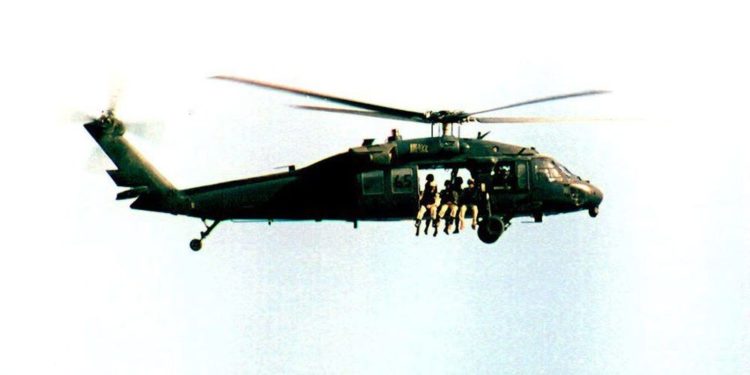At the second site, two Delta Force snipers, Gary Gordon and Randy Shughart, volunteered to be inserted and hold off the Somalis until a rescue operation could be mounted. They died defending Super 64, and both received the Medal of Honor.
In the end, 19 American soldiers were killed, including six Delta Force operators, and 73 were wounded. Chief Warrant Officer 3 Michael Durant, one of the Black Hawk pilots, was captured.
“I was there in Somalia the day after the battle of the Black Sea,” retired Delta Force operator George Hand told Insider, using another name for the battle.
“Coming in from Egypt, there was much to ponder about the mental state of our comrades. How would they be, what would they be like — aloof, angry, frightened?” Hand added.
“To my utter surprise, there was none of that from any of the men. The only thing I would say was that they played an inordinate rate of very rigorous volleyball. I had never seen a combat team ever fare so well through such trauma.”
“I credit the maturity of the operators and the Unit’s selection process,” Hand said. “These men went through sheer horror for many hours on end but managed to complete the day with comparatively light casualties.”
Hand, author of Brothers of the Cloth, a brilliant account of Delta Force missions and men, spent 10 years in Delta Force, completing deployments to Latin America, the Balkans, and Somalia, among other places.
The Aftermath
Only hours after the battle ended, reinforcements arrived in the form of Delta Force’s A Squadron and additional Rangers. Their initial mission had three components: rescue Durant, recover the bodies of Gordon and Shughart, and continue the hunt for Aidid.
In the end, the political backlash at home over the operation and its casualties forced Task Force Ranger to stand down. Delta Force’s A squadron conducted a few missions, but the Somalis ultimately handed Durant over after diplomatic negotiations.
“It’s not a secret that we did a lot of things wrong in Somalia. We didn’t fully utilize the assets we had at our disposal for honestly bullshit reasons,” a retired Delta Force operator said, referring to the Clinton administration denying the use of AC-130 gunships and M-1 Abrams tanks in Mogadishu.
“But that didn’t stop us from taking it to them. People say that we lost in Somalia because we suffered too many KIAs [killed in action]. But we did degrade Aidid’s ability to operate while devastating his militiamen,” the retired operator added.
The few hundred U.S. commandos fought thousands of Somali militiamen, killing hundreds — some reports claim thousands — and wounding many more.
That the U.S. forces accomplished the objective of capturing Aidid’s lieutenants is often forgotten, the retired operator said, “so I guess it’s something that the task force’s fighting spirit is universally recognized after so many years.”
Delta operators in Somalia wanted to get back into the fight “as quickly as possible,” and volleyball was their outlet, Hand said. “When they saw that there would be no more city combat, they played constant, rigorous volleyball to ease off the kettle.”
That three soldiers from Delta Force’s Special Unit received grave injuries during and after the battle and recovered is also often overlooked, Hand added.
“They returned to the U.S. to be fitted with prosthetic limbs and returned to the front line of battle to join their crew. That’s the American fighting man, and as long as he is held to the same rigorous standards as always, we will field the same deadly fighting machine,” Hand said.
This article was written by Stavros Atlamazoglou and originally published on the Insider.










COMMENTS